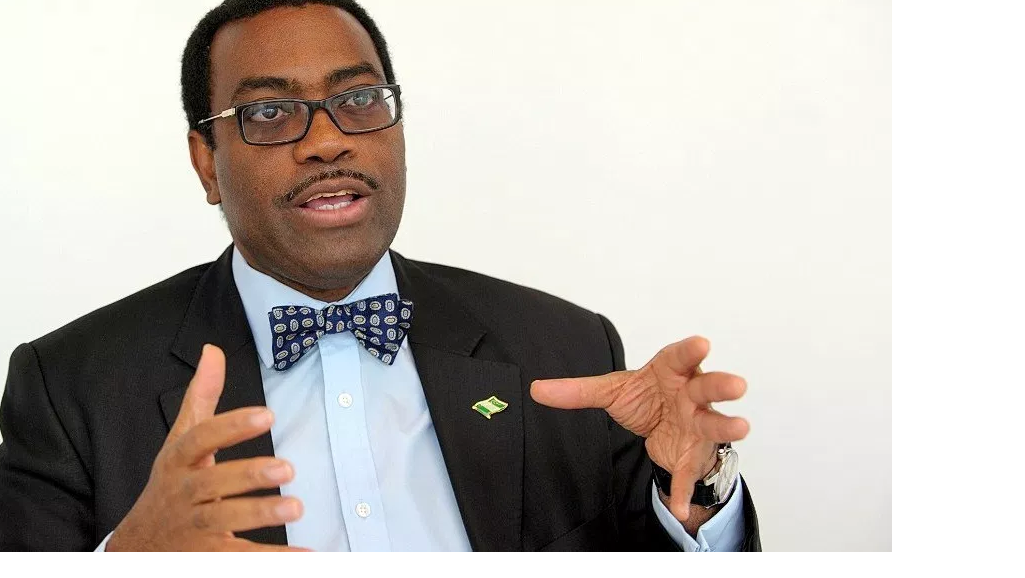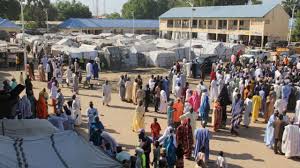OPINION
Putting Square Pegs in Square Holes – Keem Abdul

Sometime in 2017, the United Nations through its Economic and Social Council sought for taxation experts from across the world to sit on its committee to proffer solutions to issues on international taxation and cooperation. In August of that year, Antonio Guteress, Secretary General of the United Nations told the world that they had been able to get 25 of the world’s top minds in matters of taxation and the Committee inaugurated for their deliberations was called the United Nations Committee of Experts on International Cooperation.
A Nigerian was one of the 25 and was selected from among his selected peers to be the 1st Vice Chairman of the Committee. His name is Babatunde Fowler and he currently heads Nigeria’s Federal Inland Revenue Service (FIRS).This August, Mr Fowler’s tenure as head of Nigeria’s tax collection agency comes to an end and given the heavy and often dirty politics surrounding top positions such as the one he currently holds, he may not be rewarded with a reappointment to continue the great work he has been doing. Therein lies one of the perennial problems with Nigeria. There are too few good people leading the country and where there are any, they are often victimised and chased away by the fierce, petty and sometimes diabolic jostling for power by Nigeria’s ruling elite. When that happens, they are often recruited by top global organisations and they go on to do very well, leaving Nigeria to continue its steady slide into its predicted, self-inflicted and pretty much assured doom. Dr Oby Ezekwesili and Dr Ngozi Okonjo-Iweala are examples of this but so that the trend is not mistaken as peculiar to women only in a clime where patriarchy is still entrenched, then consider the case of Dr Akinwumi Adesina who currently heads the African Development Bank (ADB).
Dr Akinwumi Adesina had served as Nigeria’s Minister of Agriculture and Rural Development in the Goodluck Jonathan administration and was globally acclaimed for his phenomenal work that helped make Nigeria one of the world’s fastest growing economies at the time. Forbes had named him its Africa Person of the Year and then UN Secretary General, Ban Ki-moon appointed him as one of 17 world leaders to galvanize support for the United Nations Millennium Development Goals.
As Goodluck Jonathan’s tenure ended in 2015, it was expected that the incoming presidency of Muhammadu Buhari would at least draw on the strength and wisdom of Akinwumi Adesina, if not officially by retaining him, then unofficially in any capacity. Instead they appointed an old blundering politician as his successor and Nigeria has lost the gains made during Akinwumi Adesina’s time as Minister of Agriculture and Rural Development. Yet Adesina has continued to shine brighter outside Nigeria as head of the AFB and he continues to garner several laurels and numerous accolades across the world. Some people even believe that he is deserving of being elected to serve as Nigeria’s President and they hope that he will forgive the nation for her errant ways and run for high office in the near future. The big question in focus now however is, “Will Nigeria ever learn to ensure that her square pegs are correctly placed and retained in square holes?”
In any progressive country in the world, the stellar display of Babatunde Fowler as head of Nigeria’s premier tax and internal revenue generation agency would be rewarded with another tenure especially if the constitution allows for it. With him at the helm, the FIRS has greatly improved its revenue generation, such that in 2018, the agency collected approximately N5.32 trillion, which also bested its 2017 annual revenue of N4.02 trillion. To put that achievement in its proper context, the Agency had never before earned those figures in its history and the revenue generated with Babatunde Fowler at the helm proved to be profoundly beneficial to the Federal Government as Nigeria went through an economic recession that would have been worse if the FIRS didn’t generate the additional revenue it did to support the Federal Government.
Perhaps the only reason that Babatunde Fowler may not be reappointed as FIRS Chairman is because of his perceived closeness to the National Leader of the All Progressives Congress (APC), Asiwaju Bola Ahmed Tinubu. It is suspected that Bola Tinubu is lining up to contest for the office of the President in 2023. In certain quarters where that is a threat to other political calculations and ambitions, allowing Fowler who they believe has risen by the help of Tinubu to continue as the head of such an important national agency would further empower Tinubu to achieve that goal, if it were indeed true. It is indeed true that it was when Bola Tinubu was Governor of Lagos State that Babatunde Fowler first entered public service but that does not in any way make Fowler beholden to his former boss. It is undeniable that his phenomenal work increased the state’s Internally Generated Revenue (IGR) from an average of N3.6 billion per month in January 2006 to a monthly average of N20.5 billion in 2014. That he was able to replicate and surpass that feat at federal level heading the FIRS is enough reason to give him a second tenure. However his perceived ties to Bola Tinubu might see to it that he does not. Already the Asiwaju’s political opponents have come out with their guns blazing and Fowler is being targeted by an unscrupulous smear campaign.
If indeed Babatunde Fowler loses his current job at the FIRS, it would be to Nigeria’s gain if he were to be deployed to the Central Bank of Nigeria, an organisation in need of able leadership and one that he is eminently qualified to run. He would also be a great pick for Minister of Finance. However if he is entirely schemed out and is ultimately taken out by Bola Tinubu’s enemies, perhaps the Jagaban Borgu should position him to become the next Governor of Lagos after Babajide Sanwoolu. Several top global bodies and business organisations are reportedly waiting to snap Fowler up and it would be to Nigeria’s detriment to lose yet another shining star to the darkness that pervades our political spaces. Nigeria must learn to always put its square pegs in square holes.
OPINION
For Akpabio, a Teachable Moment
By Olusegun Adeniyi
Senate President Godswill Akpabio is renowned for his arrogance and hubris. So, when he tendered a public apology to Senator Natasha Akpoti-Uduaghan on the floor of the senate Tuesday, the stakes must have been very high.With a faceless but popular blogger running a vicious campaign against his family and threatening not to stop until Akpabio apologised to a female colleague he needlessly demeaned, it was obvious something would have to give.
And the public statement, issued by a group of powerful women on the same issue, must have persuaded even a man like Akpabio that he had carried his offering beyond the sacred place. The controversy began when Akpoti-Uduaghan attempted to speak before being recognised, an action that drew sharp reprimand from Akpabio. Despite her apologetic tone, Akpabio would not let it pass. He retorted with the biting remark that the Senate is not a “nightclub”.On Tuesday, Akpabio said, “Distinguished Senator Natasha, I want to apologise to you…I do not mean any harm. People should concentrate on things that will move this country forward. Social media handlers should practice with decorum. We won’t out of anger regulate social media.”I am impressed by how Akpabio handled this situation. Many Nigerians still recall his altercation with Dr Joy Nunieh in the Niger Delta Development Commission (NDDC) during his stewardship as Niger Delta Minister.But it is unfortunate to hear that Akpabio’s wife was dragged into what does not in any way concern her. Those who purportedly called to denigrate her exhibited the same traits they accuse Akpabio of. They obviously have no respect for women. No matter how we feel about issues, certain lines should not be crossed.On Monday, 24 hours before his apologies, a group of respected female professionals in the country under the aegis of Voices for Inclusion and Equity for Women (VIEW), released a public statement on what they described as a “disheartening display of disrespect and gender bias” by Akpabio.Signatories included Aisha Muhammed-Oyebode, Aisha Waziri, Amina Salihu, Asmau Joda, Ene Ede, Ene Orgah, Fatima Akilu, Ier Jonathan-Ichaver, Kadaria Ahmed, Larai Ocheja Amusan, Mairo Mandara, Maryam Lemu, Maryam Uwais, Nguyan Feese, Rekiya Abaji, Sa’ida Sa’ad, Saudatu Mahdi, Ummahani Amin, Zainab Salihijo and Zaynab Musa.Although the VIEW statement was anchored on how the senate president compared Akpoti-Uduaghan’s conduct to behaviour suited to ‘a nightclub’, they added that “This is not the first instance of such behaviour from Senator Akpabio; he recently silenced Senator Ireti Kingibe in a similarly dismissive manner, underscoring a troubling pattern.”Before I address what has become an institutional problem, let me state clearly that I do not subscribe to the erroneous notion that the leadership of a National Assembly controlled by the ruling party should be acrimonious in their relationship with the executive.In the United States from where we borrowed the presidential system of government, lawmakers from the ruling party collaborate with their president in the interest of the country without compromising their own integrity as an independent arm of government. But the leadership of an institution with the power of oversight on issues of transparency and accountability cannot be slavish in its dealings with the president.While Akpabio may have apologised to Akpoti-Uduaghan, it is increasingly becoming a fad, especially in the Senate, that those who make laws for the rest of us can only find relevance in denigrating Nigerian women.It did not start with Akpabio. In presenting a motion to mark the International Women’s Day 2016 eight years ago, then Senator (now First Lady) Oluremi Tinubu argued, “We represent courage and resilience; without us (Nigerian women) I don’t think this country will move forward.” But the significance of the motion was lost on most of her male colleagues who trivialised the issue.Making his contribution, then Senate Leader, Ali Ndume (who is now facing persecution from his own party for being critical of the president), said: “I urge men to marry more than one wife. The first care of a woman is marriage. Men should take care of women by not just befriending them, but by going further to marry them. I know there is nowhere in the Bible that prohibits marrying more than one wife. Starting with the senate president (Dr Bukola Saraki) I ask him to consider marrying more than one wife.”On a day the United Nations invested the theme, ‘Planet 50-50 by 2030: Step It Up for Gender Equality’, Ndume made a formal request in plenary. His prayer was seconded by Senator Suleiman Nazif. But Senator Binta Masi Garba did not allow the insult to go unchallenged: “We are not sex objects. Bible is in support of one man, one woman. We want gender parity where women and men can work side by side,” she said.When those responsible for making our laws do not consider women as equal but rather mere consorts, we have a huge problem. A week earlier, in his contribution to the motion by Senator Enyinnaya Abaribe, advocating the need to patronise products made in Nigeria, Senator Dino Melaye said most memorably: “We must reduce the allocation for made-in-Nigeria goods and services to the basics. What are those factors limiting the production of these goods? We must tackle them. We must also begin to look at our legislation, then, we will begin to talk about made-in-Nigeria goods. We will also move to encourage made-in-Nigeria products and begin to talk about made-in-Nigeria women…”The foregoing illustrates that the issue of disrespect for women goes beyond the person of Akpabio. It is institutional; even though the House of Representatives has shown more decency on the issue. On 15th March 2015, the Senate voted to dismiss the Gender and Equal Opportunities Bill, 2016, sponsored by Senator Biodun Olujimi who was then Minority Whip. The bill sought to accord women rights equal to those of men in various spheres of life and to prohibit certain discriminatory practices.Interestingly, those who opposed the bill used religion as cover. While Senator Ahmad Rufa’i Sani cited the Quran to oppose it, Senator Emmanuel Bwalcha found his own justification in the Bible. The bill has been tabled at different times since then and has met not only rejection but ridicule by Senators. It therefore came as no surprise that not a single male senator thought it fit to censor Akpabio when he made the disparaging remark about Akpoti-Uduaghan in plenary.I once referenced a 2013 piece ‘How Nigeria legalizes discrimination against women’ by Dr Aminu Hassan Gamawa, currently Chief of Staff to Governor Bala Mohammed of Bauchi State. Then pursuing his doctorate at Harvard Law School, Aminu had argued that the language used by the Nigerian constitution “is not gender neutral, perhaps because it was written by men.” For example, according to Aminu, “the pronoun ‘He’ appears in the 1999 constitution about 235 times.”Again, under our criminal law, he pointed out, a man cannot be deemed to have raped his wife because, “Section 182 of the Penal Code provides that ‘sexual intercourse by a man with his OWN (emphasis mine) wife is not rape if she has attained puberty’”. Section 55 (1) (d) even recommends that a man should keep in the house what my wife called ‘Dr Do-Good’ (when our children were growing up) “for the purpose of correcting his wife”.Therefore, before we reduce this serious conversation to the banality of whether a ‘side chick’ (whatever it means) is part of the ‘constituency projects’ of our distinguished senators, we must call out the chauvinism and prejudice that drive public engagement in Nigeria.
I concede that a patriarchal society such as ours revolves around the ‘man of the house’. But for us to develop as a nation, we must begin to cede to our womenfolk the rights and respect they are due.It is a paradox that within Nigerian culture, as well as both Christianity and Islam, the mother is elevated to a distinct place of honour and respect. Yet, our elected legislators as influential policymakers, professing to be patriotic Nigerians and devout faithfuls, continue to denigrate and trivialize the voice of the female gender.You can follow me on my X (formerly Twitter) handle, @Olusegunverdict and on www.olusegunadeniyi.com
OPINION
Building Collapse: When Shelters Become Death Traps

By Uche Anunne
Shelter is one of the basic necessities of man. Shelter was meant to provide protection for man against stronger primates in the jungle, and a cover against elements. The cave served that purpose.It has evolved to serve man in various areas. Today, it serves as a place of worship, work, education, recreation, sports, entertainment and business among others.
The more the need for shelter the more it is designed to fit those needs. The desire to minimise land use, celebrate aesthetics and elegance led to building taller structures.Today high rise buildings dot the landscape all over the world. In Nigeria and in many developing countries, what is meant to solve man’s special need has become a source of nightmare to many families.Many families have lost their loved ones in building collapse in various parts of the country.Those who survive it are left with physical and or mental scare. Businesses are ruined and several billions of naira lost in these unfortunate incidents.A report by The Brookings Institution showed that between 1974 and 2019, more than 211 buildings collapsed in various parts of the country, with more than half of the incident occurring in Lagos State.According to the Think Tank, between 2000 and 2021, Lagos State recorded 167 incidents with 78.4 percent being residential buildings and 12.8 percent commercial buildings while the remaining 8.8 per cent were institutional buildings.The incidents displaced no fewer than 6,000 households with an estimated loss of $3.2 trillion worth of property.The recent gale of building collapse calls for urgent attention from stakeholders to address the challenge.On July 13, four persons were rescued from the rubble of a collapsed two-storey building in Kubwa area of Abuja according to Mrs. Florence Wenegieme, Acting Director FCT Federal Emergency Management Department.Earlier on July 10, seven persons were pulled out of the rubbles of a collapsed another two-storey building at Mushin area of Lagos State on Wednesday.Dr Olufemi Oke-Osanyintolu, Permanent Secretary, Lagos State Emergency Management Agency, LASEMA, was quoted by the media as saying that those rescued consisted of three females and four males.In Kano State, on April 26 three persons died following the collapse of a three-storey building in the Kuntau area of Gwale Local Government Area of Kano State, according to Dr Nuradeen Abdullahi, Kano Coordinator, National Emergency Management Agency.On June 17, 2011, three persons died as a building under construction at University of Nigeria, Nsukka, caved in. Five construction workers were rescued and taken to the intensive care unit of the University of Nigeria Teaching Hospital, Enugu.Yet on July 13, the city of Jos, Plateau was thrown into mourning following the collapse of Saint Academy, Jos school building. No fewer than 22 persons, mostly students, died and 154 others injured according to official accounts.The Nigerian Institute of Civil Engineers (NICE) says the country has recorded 41 building collapses in the last 17 months.Observers wonder why what should be a place of safety should become a death trap. Questions are raised as to how it should be reduced to the barest minimum.Paul Erubami, the Chief Executive Officer, Max-Migold, a physical property management firm, says effective facility management sector can stem the tide of building collapse in Nigeria.“It starts with knowledge; it starts with skills and these are how to put the right processes in place,” Erubami said.Prof. Samson Duna, Chief Executive Officer, Nigerian Building and Road Research Institute (NBRRI), attributed building collapse to use of substandard materials among others.According to Duna, 80 percent of building collapse happens during the rainy season due to some natural causes and because the materials were substandard.He, therefore, recommended training and retraining of engineers and professionals in the construction sector should attend refresher courses to refresh their knowledge.He said the government and professional bodies should sensitise the general public on the steps to follow when embarking on building projects.“All professional bodies should strengthen its arm of monitoring, to ensure they function effectively during project supervision.“The professionals must be involved in monitoring and evaluation of building projects and funds for the supervision should be incorporated in the cost of the project,“ Duna said.The Nigerian Association of Technologists Engineering (NATE) blames the challenge on the failure to keep to the ethics and codes of building, cutting corners in terms of the required materials are the main causes of building collapse.Dominic Udoatan, the national president of the association, however, expressed hope in the Council for the Regulation of Engineering in Nigeria (COREN) determination to work on the issue through closed monitoring.He said it was important that only professionals were saddled with the responsibility of erecting buildings.The Nigerian Institution of Structural Engineers (NISTRUCTE) also points accusing fingers at CORENPresident of the institution, Dr Kehinde Osifala, said that non-regulation of the practice by COREN was at the root of incessant collapse of buildings and structures in Nigeria with many quacks operating freely.He pledged the institution’s readiness to partner with COREN to flush out quacks from the building industry and save the nation from the agony of building collapse.Then Permanent Secretary of the Federal Ministry of Works and Housing, Mahmuda Mamman, gave COREN a marching order.“I urge you to strategise and hatch out a plan to stop this menace of building collapse. There should be no more cases of building collapse and this lousy situation be brought to a stop” he said.He also directed the conduct of thorough checks, registrations, and mandatory monitoring of construction activities to ensure Nigerians live in well-built, solid buildings without any fear of building collapse, no matter the weather.Sadiq Abubakar, industry regulator, COREN, said for instance, there were complexities involved in prosecuting cases of building collapse and called for the involvement of trained investigators and regulatory reforms.“Once you go to a tribunal, you need diligent steps to gather evidence. Building collapse has different causes, and without proper sampling and investigation, it becomes challenging to prosecute”, he said.The COREN president said another challenge to effective supervision was economic. He said the issue of substandard materials and construction practices could be caused by economic pressures such as the rising cost of cement.“There is a direct correlation between the price of cement and building collapses. When costs rise, clients often cut corners, leading to compromised building integrity,” he told newsmen.Abubakar suggests the training and certification of professional investigators in the construction sector to enhance prosecution of suspects in building collapse.He also canvassed decentralising investigation panels and tribunals to ensure timely and effective responses to building collapses.“We must train investigators who are qualified, competent, and can even go to other countries to investigate. This we don’t have now, but we’re working towards that,” he said.“We have identified gaps in the regulatory and legal framework and are packaging amendments to address these issues.“There is the need for collaborative efforts among all actors in the building environment, including architects, builders, and surveyors. We must work as a team to ensure compliance and accountability,” he said. (NAN)
OPINION
Olympics: Team Nigeria Ready to Compete among World’s Leading Athletes

By Olanrewaju Akojede
Team Nigeria will begin a fresh phase of participation when the 2024 Paris Olympic Games begin on July 26 in Paris, France.
The Paris Olympics, which is its 33rd edition, is scheduled to end by Aug. 11 while the Paralympics is expected to hold from Aug.
28 to Sept. 8.Nigeria’s target is to put up a master class performance akin to its famous outing at Atlanta 96 Olympics where the country garnered six medals at the Games.
Nigeria is fielding a strong team of 82 sportsmen and women who will compete in 11 sports at the 2024 Games in Paris.
Track and Field is leading the contingent in terms of numbers with 32 athletes, consisting of 14 males and 18 females at the Games.
Nigeria will also be represented in Basketball, Badminton, Boxing, Canoeing, Cycling, Football, Table Tennis, Taekwondo, Weightlifting and Wrestling at the Paris Olympics.
With a total medal haul of two gold, one silver and three bronze at the 1996 Games in Atlanta, the country’s performance till date remained the first and only time that Team Nigeria won two gold medals in the Olympics.
Leading the medal zone was a fantastic brilliance of Chioma Ajunwa, who leaped to a 7.12 metres to set the record as the first West-African female athlete and the first Nigerian to win an Olympic gold medal in track and field.
Nigeria also created another memorable record by winning another gold medal in the male football event against all odds and against the big guns in the sport such as Brazil and Argentina.
Nigeria’s football team, tagged the ‘Dream Team’, was led in that epoch-making event by Kanu Nwankwo, the then African Footballer of the Year.
The team comprised other football greats such as the mercurial midfielder, Austin Okocha.
Their defensive wall was marshalled by Taribo West, Uche Okechukwu, Sunday Oliseh, and Celestine Babayaro, with attacking power play of Daniel Amokachi, Wilson Oruma and speedy winger Emmanuel Amuneke among others.
They went on to record an incredible comeback 3-2 win over Argentina in a dramatic final and claimed their first-ever gold in football at the Olympics.
Other success stories at the 1996 Olympics included a silver medal in the women’s 4x400m with the quartet of Falilat Ogunkoya, Olabisi Afolabi, Fatima Yusuf and Charity Opara.
Also, Nigeria’s woman of candour in sprints, Mary Onyali, powered to a silver podium finish in women’s 200m, while her compatriot, Ogunkoya, won a bronze in the women’s 400m.
Ace boxer Duncan Dokiwari won a bronze medal as well.
Since that historic performance about 28 years ago, subsequent performances in the quadrennial Olympics had been measured by the performances in the 1996 Games.
Till date, for Nigeria, no Olympics show has outperformed the 1996 spectacle.
Indeed, Nigerians had wondered why subsequent Team Nigeria failed to replicate the feat recorded at 1996 Olympics.
While the flag-off of the 2024 Olympics remains just a few days to go, Nigerians are, no doubt, expecting the present squad of 82 sportsmen and women to equal and surpass that record.
Nigeria’s powerful squad in athletics is led by the country’s Queen of the track and World Record holder, Oluwatobiloba Amusan, in company of Rosemary Chukwuma, Favour Ofili, Tima Godbless, Ella Onojuvwevwo in Women’s 400m as well as Esther Joseph, at the Games.
Others in the mix include Ruth Usoro (Women’s long jump); Ese Brume (Women’s Long jump); Prestina Oluchi Ochoogor, Obiageri Amaechi (Women’s discus); Ashley Anumba, Chioma Onyekwere, Oyesade Olatoye (Women’s hammer throw); Women’s 4×100 metres Relay and Mixed 4×400 metres relay.
Nigeria’s Super Falcon also returns to the show in the Football event with an 18-woman squad after several years’ absence.
The Super Falcons, in a tough group with Champions Spain, Brazil and former world champions Japan, are, however, tipped for a podium finish at the Games in spite of the odds against them.
According to the Secretary-General of Nigeria Olympic Committee (NOC), Tunde Popoola, Nigeria has a strong football team to scale through their group.
”Also, we expect medals in Athletics, Weightlifting and Wrestling. We will surprise Nigerians with bags of medals,” he said.
Another female team, D’Tigress will also aim to better their record in the female orBasketball event with their 12 players on parade.
Nigeria will also parade three boxers to be led by Olaitan Olaore, who aims for a good show in men’s heavyweight; Dolapo Omole, who will also compete in men’s featherweight category; and Cynthia Ogunsemilore, who reigns in the women’s lightweight class.
It is worthy of note that, for the first time since 2016, Nigeria will send three boxers to the Olympics
Also, Nigeria will have high hopes in Weightlifting relying on the form of Rafiatu Lawal and Adijat Olarinoye.
The 24-year-old Olarinoye is not new on the world stage as she has earlier won gold at the Commonwealth Games in Birmingham two years ago.
She will seek to make Nigerians proud at a bigger podium at the Paris Olympics.
In other sports Nigeria will have two women in Canoeing, one female representative in Cycling while Aruna Quadri with Olajide Omotayo will lead the men in table tennis alongside Offiong Edem and Fatima Bello in the women’s category.
Taekwondo will also feature one female; Weightlifting will have two females while Wrestling will have a male and five females for a total of six athletes.
Team Nigeria will be fielding 20 males and 62 females at the Paris games.
The Minister of Sports Development, Sen. John Owan-Enoh, knowing the task ahead and the need for Nigeria to improve on their performance has been talking and doing the work to get the athletes in top shape ahead of the quadrennial games to be hosted by France.
At the presentation of N100 million donated by the House of Representative members, the minister said that the aspiration of the ministry was to surpass the previous best Olympic record achieved in 1996, at the 2024 Olympic Games in Paris.
He also said that the cash contribution from the House of Representatives would go to athletes.
He also announced increased allowance and bonuses will accrue to the athletes.
Owan-Enoh said,”Just like it was with the African Games in Accra, Ghana, I will spell out from A-Z, the entitlements for our athletes.
”My aspiration is for the nation to surpass our previous record from our best Olympic Games performance in 1996.
”We’ve been working on this goal through our preparations, arrangements, and performance team working with athletes in Germany. I am getting reports on the progress every day.”
”We want to get our athletes to feel appreciated and wanted by our country.”
He also said,” The entire N100 million donations from the Federal House of Representatives will entirely go to the athletes.”
In addition to this, athletes will receive local camping allowance, foreign training grants, foreign training camp allowances, Olympic Games allowances, and winning bonuses.
The Minister also told newsmen in Abuja that the Federal Government had approved more than N12 billion for Team Nigeria at the 2024 Paris Games.
The Minister’s commitment to transparency and support for the athletes underscore the federal government’s dedication to ensuring Team Nigeria’s success at the Games.
As the clock ticked within a few days to the Paris 2024 Olympic Games, Owan-Enoh said that his ministry, as the supervising arm, was ticking all the boxes.
He said that the atmosphere was frenetic and excitement palpable as showmanship and calisthenics set the stage for the 2024 Olympic Games in Paris, France.
He said that Team Nigeria is in top spirits as it prepares to fly its colors at this quadrennial sporting showpiece of global attention.
He also said that Nigeria’s contingent encompasses talented and world-class athletes who are set to take the world by storm.
He said, ”With several months of preparation and training, athletes such as Oluwatobiloba Amusan, Ese Brume, Blessing Oborodudu, the two Favours (Ashe and Ofili), Odunayo Adekouroye, Chukwuebuka Enekwechi, Aruna Quadri, among other names too numerous to mention, the nation flies to Paris with strong hopes.”
Sen. Owan-Enoh also urged Nigerians to throw their weight behind the nation throughout the Games.
”Our athletes are putting in tremendous effort and dedication in their preparations.
”We are confident that with the support of every Nigerian, our team will excel and make the nation proud,” he said.
Owan-Enoh said that following the domestic camping, the contingent proceeded on foreign camping to acclimatise, focus and step up preparations for the Games.
”The Super Falcons camped in Spain, while the other athletes camped in Saarbrucken, Germany,” he said.
He also said that the prioritisation of the welfare of athletes had been demonstrated by the increase in bonuses and allowances payable to them.
”Additionally, domestic camping allowances, foreign training grants, foreign training allowances, Olympic Games allowances, and winning bonuses will be given to ensure our athletes are well-supported.
”Let’s unite in support of our athletes as they embark on this remarkable journey.
”Our aspiration is not just to participate but to excel and bring home the medals,” Owan-Enoh said. (NAN)



























